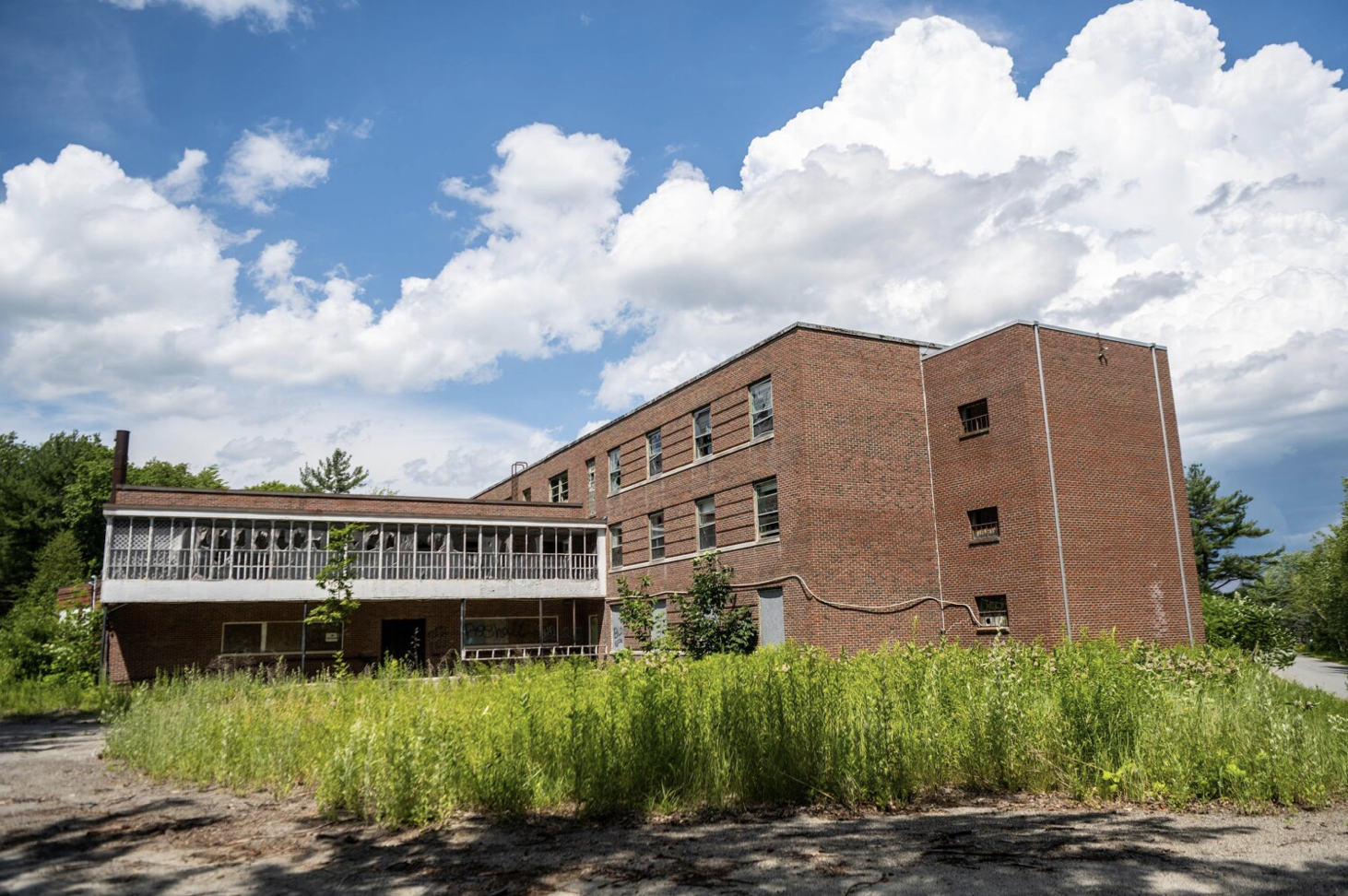PHOTO/Tim Greenway. At the future Cambria, Matt Cook, left, president of Allied/Cook Construction; David Bateman, president of Bateman Partners; and Nathan Bateman, vice president of Bateman Partners.
By Renee Cordes, Staff Writer, Mainebiz Magazine
The new kids on the block are raring to go — three upscale downtown Portland hotels opening this year. Together they’ll add 394 new rooms, bringing the city’s total to 3,415, including bed-and-breakfasts. (Click for ORIGINAL Mainebiz article)
First out of the gate are the Canopy Portland Waterfront and Aloft Hotel Portland, both on Commercial Street, followed later in the year by Shipyard Brewing Co.’s Cambria Hotel Portland Old Port, frequently referred to as a “brewtel.”
Though the newly built establishments will debut at a precarious time for tourism and hospitality after last year’s pandemic pummeling, their backers are convinced of their staying power — and Portland’s lasting luster.
“We’re very bullish on Portland in general, and Commercial Street is the place to be,” says David Leatherwood, CEO of Norwich Partners LLC, the New England- and Florida-based hotel development and investment firm behind the Aloft. Adjacent to a mixed-use project at the former Rufus Deering Lumber site, it’s set to open in May. That puts it in the heart of a downtown building boom that goes well beyond hotels.
“It certainly conveys to the traveler, ‘I’m in the right place, surrounded by construction and new development,’” he says.
Fathom Cos. President Jim Brady has a similar view, after securing one of the peninsula’s last big buildable lots, also on Commercial Street, for the Canopy.
Still a beehive of activity in late March with Cianbro workers installing interior fittings, it’s slated to open this spring at a date to be determined.
“We feel optimistic,” Brady says. “It’s nice to be able to open into the strength of this summer, when people feel ready to travel again.”
Travel’s sweet spot
Though it’s a risky time to open a new hotel anywhere, Portland developers are counting on strong pent-up demand from leisure travelers, starting with those coming by car, to put Maine’s biggest city in 2021’s sweet spot.
Those expectations are backed by a McKinsey & Co. report published in January about how the COVID-19 crisis and the recovery are shaping the global economy. It found that people who travel for pleasure will want to get back to doing so, because of the “very human desire to explore and to enjoy,” while business travel will take longer to bounce back.
An American Express report released in March paints a similar picture. Out of 3,000 travelers in the United States and six other countries surveyed in January, 87% said that having a trip planned in the future gives them something to look forward to, while 56% said they miss travelling so much they are willing to book a trip now even if that means having to cancel later.
As air travel starts to pick up nationwide, the Portland International Jetport is poised to draw more visitors to Bon Appetit magazine’s 2018 “City of the Year,” with new summer routes by United, American, Frontier and others taking off.
That makes the timing “perfect” for three new hotels in Portland, in the eyes of
Greg Mitchell, the city’s economic development director, who says that each will bring a different experience for visitors. He also points to the strong track records of the owners and operators.
“These are people with a long history in Portland that understand Portland and are committed to Portland for the long range,” he says. “That in itself has been a huge level of confidence for me — despite the pandemic, they’re proceeding with their projects.” Unconcerned about overdevelopment in tourism, he adds, “Our economy is strong and diversified, and it’s just getting stronger and more diversified.”
Visit Portland President and CEO Lynn Tillotson says booking trends point to a strong 2021 season driven by leisure travelers.
“Tourism drives the vitality of our region, and it’s the vitality that drives businesses to develop here and people to choose to live here,” she says. “Tourism is essential to our success.”
Those behind the new hotels coming online in 2021 are determined to stake their claim in a competitive market that will continue to get more crowded, not just in Portland but also in Westbrook, Scarborough and South Portland.
“There’s a competitive market because there’s a need,” notes Joseph Caradonna of Koucar Management LLC, a Michigan-based development firm that teamed up with Shipyard, Bateman Partners LLC and others on the Cambria.
Bateman Partners President David Bateman adds, “I’m a big fan of Portland and have been since the 1970s. … People forget that the city has gone through many ups and downs and rebirths, which is why the symbol of the city is the phoenix. We’re on a very good tangent.”
Aloft’s ‘golden’ moment
For Norwich Partners, the Aloft Hotel Portland will be its third in the city. It owns the AC by Marriott, which opened in 2018, and sold the Residence Inn to an undisclosed buyer in 2017.
Founded in 2003, Norwich Partners has owned equity stakes in 27 hotels around the country, and the Aloft is one of four hotels it’s opening this year — and the only one outside Florida. Though that’s twice its normal amount, some openings were delayed because of the pandemic.
Leatherwood, who has helped develop more than 4,000 hotel rooms with a $1 billion-plus market value, predicts that “Portland is going to have a booming summer.” Lest there be any concerns about an oversupply of rooms, he says, “I’ve heard that since 2002, and it’s never been true — it’s a very resilient market — with this caveat: If you are truly downtown, and you are on or near Commercial Street, you’re golden.”
Speaking by phone from Sanibel Island, Fla., Leatherwood describes the Aloft as a “hipper, younger version of the AC.” While both are Marriott-owned brands, Aloft targets young families and millennials as a “very high-tech forward” brand with amenities including a robotic butler that makes deliveries to rooms. It also aims to be music-oriented, inviting local street musicians to play in the lobby.
Despite a slight delay in furniture deliveries held up by the recent Suez Canal blockage, he’s hopeful of an opening by early June. Like the AC, the Aloft will be managed by Boston-based Pyramid Hotel Group LLC for Norwich. It normally makes an exit after a few years though that’s not set in stone.
“Everything is for sale, but nothing is on sale,” Leatherwood says, “meaning if we opened the doors of the Aloft Hotel today, we would sell it the next day if we got the right price.” He doesn’t rule out doing further deals in Portland, where he hopes that some restaurateurs who had to close during the pandemic will reopen or reinvent themselves with a new concept.
“The city will come back,” he says.
Raising the Canopy
Unlike Norwich Partners, Jim Brady’s Fathom Cos. is involved in both hotel development and management, starting with Portland’s Press Hotel in a renovated Art Deco-era newspaper building.
The Canopy by Hilton is a new build on an empty lot — where E. Swasey & Co. once made pottery and glassware — that had long been on Brady’s radar. While he won’t disclose what he’s investing to build the 104,000-square-foot structure, he notes it wouldn’t be for less than $300 a square foot — or at least $31.2 million.
Despite rising construction costs and some furniture delivery delays, there’s been no skimping on the design — the interior is by Portland’s Ealain Studio — which built a model room in a warehouse as a test run down to the plumbing and fixtures.
“It’s a great exercise, and at the end of the day I’m confident it leads you to building a better project,” Brady says.
The Canopy Portland Waterfront, which broke ground in October 2019, is targeting a spring opening albeit with no firm date. Confident that demand from leisure travelers for outdoor destinations puts Maine in a strong spot, Brady expects a similar pickup in business travel by the fall.
Brandon Hussey, Fathom’s sales and marketing director, voices a similar view as reservations for later in the year start to come in, noting during a site walk-through: “It’s encouraging to see some of those get in the books.”
While the Canopy and Press Hotel will in part be competing with one another, Brady also expects operational efficiencies. Like the Press Hotel, he expects the Canopy to employ around 100 people when fully up and running.
Brady, who has other, non-hotel development projects in Biddeford and Lewiston, says he’d be open to other opportunities in Portland but probably not immediately given constraints on new development.
More generally, he says: “We’re excited about the Portland marketplace and hope that people continue to want to come here for both work and play.”
Cambria’s autumn aspirations
Bucking the Commercial Street trend, the Cambria Hotel Portland Old Port is out to conquer the eastern waterfront, an emerging area for commercial development.
“For years it was no man’s land, but that’s not the case now,” says Bateman, of Bateman Partners, the developer behind the project with a huge portfolio of residential and commercial projects.
As with the Portland Harbor Hotel and the Inn at Diamond Cove, Bateman Partners develops hotels but leaves management to others. For the $27.5 million, 102-room Cambria, it has teamed up with Shipyard and other partners including Donohoe Cos. of Bethesda, Md.; and Detroit-based Koucar Management.
They’re aiming to open by the start of the fourth quarter, and while that means missing the summer season, Bateman says, “We’re optimistic we’re going to have a good fall, and you have to roll with the punches.”
He adds that “there are a lot of fun things we can plan over the winter,” in the same spirit as the Portland Harbor Hotel’s Ice Bar tradition. Starting new beer traditions at the Cambria, the indoor-outdoor rooftop bar will feature actual hops plants to be used in beer made by Shipyard.
“Someone once told me the closest thing to being in show business is hotels,” Bateman says. “You either love it or you hate it. I’ve come to love it.”
Interestingly, it was recorded drone footage of Casco Bay that lured the Batemans to the Cambria hotel project, which is entirely pre-fab construction.
Once completed, his firm’s involvement will end, as per its usual practice, leaving others to manage the new establishment.
“Construction projects are always bittersweet,” Bateman admits. “We enjoy designing and building them, but once they go out in the marketplace it’s like raising a child, and then saying, ‘Let’s see how you make out in the real world.’”








